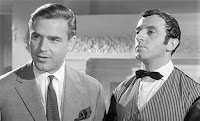Edie Adams is a psychology professor; Carol Lynley, her niece, is in Adams' class on marriage. Lynley and her boyfriend (Dean Jones) are fighting their natural desires to have sex, and she is fighting his urge to get married—as they make out under a tree on campus, she says to him, "I won’t be lobbied into marriage by overstimulated glands!" So Lynley has an idea: she wants to move in with Jones on a strictly platonic basis to see how compatible they are before they jump into marriage. As it happens, Adams is moving out of her apartment complex where she has been involved in a casual affair with the scuzzy landlord (Jack Lemmon), who only rents to single beautiful girls. Lynley takes the place and Lemmon is ready for another conquest, but when he discovers Jones' presence, he becomes even more determined to have Lynley. What follows is a series of scenes alternating between Jones being horny and frustrated; Jones and Lynley arguing; and Lemmon trying to sneak a peek inside to make sure they're still platonic, encouraging Jones to do things like throw himself into athletic activity to channel his carnal desires. Finally, the stage is set for the climax, if you will, in which Jones brings home some mescal for a romantic dinner so he can get Lynley drunk and consummate their relationship—but not if Lemmon can stop it.
You may be able to tell from my summary that this is a one-note sex comedy with a laser focus on "will they or won’t they?" Actually, that's not quite accurate. Had it been only that situation, the movie might have been a little more bearable. But Jack Lemmon's sour, unsympathetic, reprehensible character sinks the movie for me. Lynley and Jones make for an attractive and likable pair of horny kids, though the teasing that Lynley does (in theory without realizing it) is a bit much. Adams is fine, and the comic pairing of Imogene Coca and Paul Lynde as a married couple who do work around the complex is fine. But Jack Lemmon's occasional tendency to chew the scenery is indulged constantly, and by 45 minutes in, I was tempted to bail. There is nothing sympathetic about his character, and had Jones killed him in cold blood, I would have called that a happy ending. Robert Lansing plays Adams' current beau, and a very young Bill Bixby has a one-minute part. The title, which is never spoken but may refer to the tree under which we see Lynley and Jones kissing in the beginning, comes from a one-time reference Lemmon makes to sex as "yum-yum." The sets are stagy but nice; I especially love the apartments of Lynley (spacious and modern and multi-level) and Lemmon (lurid and deep red). I realize that in a sex farce, character development is not primary, but I had a hard time buying the Adams and Lemmon relationship—she seems way too brainy to be attracted to him. I would recommend this as a 60s period piece, reflecting the changing morality of the times, and for the lively performances of Lynley and Jones (pictured). Also for the appearance of Orangey, the famous and well-trained movie cat known best for his important role in Breakfast at Tiffany's. [DVD]










